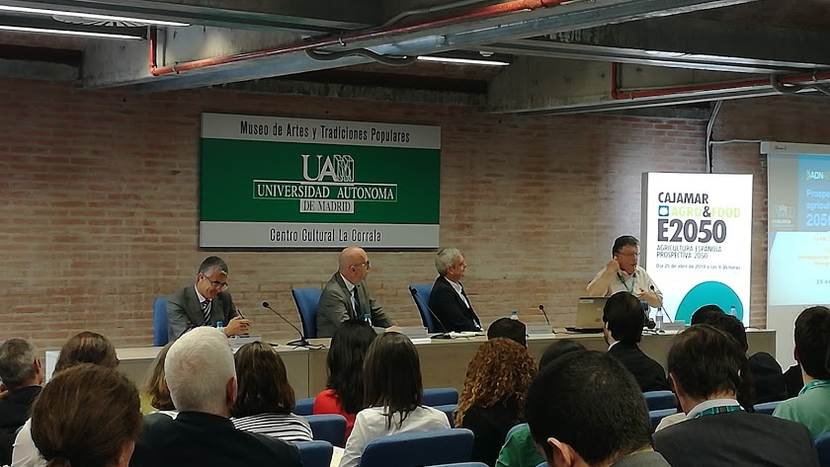Future challenges of the Spanish agri-food sectors
They were identified by a dozen of experts during the seminar "Prospects for Agriculture 2050", organized by the cooperative bank Cajamar.

In the next 20 years, Spanish agriculture will undergo a profund transformation of its production model due to two main reasons: on the one hand, this activity linkage to the environment will be fundamental to face with guarantees the challenges presented by the climate change; on the other, consumer trends in the target markets for Spanish products, in which health and food security every day play a more relevant role in consumer purchasing decisions.
In his presentation, Prof. Elías Fereres detected the agronomic challenges that Spain has, such as improving its agricultural productivity, reducing post-harvest costs, diagnosis and correcting sustainability problems (soil erosion, lack of water resources).
For Dr. Marta Tortajada, the bio economy appeared as the economic model that offers business opportunities to the Spanish sector in order, among others, to create new value chains (functional ingredients, probiotics, genomics, industrial bioprocesses).
Prof. Inés Uclés presented an analysis of the climate change impact in the Mediterranean area, with increased temperatures, greater shortage of rainfall and a greater presence of extreme weather events. To mitigate those effects, she enumerated resources and instruments such as the use of biotechnology to obtain plant varieties more tolerant to cold or drought stress, the orientation of the agricultural systems to this new reality or the importance of technologies to monitor and control crops.
Representing the Almería Solar Platform, Diego Alarcón assured that desalinated water is already a reality to combat drought in the Mediterranean Southeast. According to him, by 2050, this resource will grow linked to the use of renewable energy resources though reverse osmosis. He indicated that, for desalinated water to be profitable, its cost cannot exceed 30 €cents per m3.
With regards to new consumers, the consultant David del Pino listed the keys guiding the consumers' demands. The product appraisement in function of the consumer's perception on its value causes the market to be oriented towards low range products or high range products. A marketing lesson was pointed out for the Spanish sector, to approximate its product offers to premium or gourmet foods.
Del Pino also indicated the trends orienting the fruit and vegetables have names as "natural", "local", "convenience", and new market segments are focused on organic produce, fair trade, sustainability, climate change.
The meeting ended with the presentation of a former EC's official, Tomás García Azcárate, who said that "it no longer makes sense to talk about agricultural policy but about a food policy and a territorial policy".
The closing was in charge of Roberto García Torrente, from Cajamar, stating that "we are the first European country in value added of its agricultural production but only the fifth one in food's value added".
Source: lavoazdealmeria.com